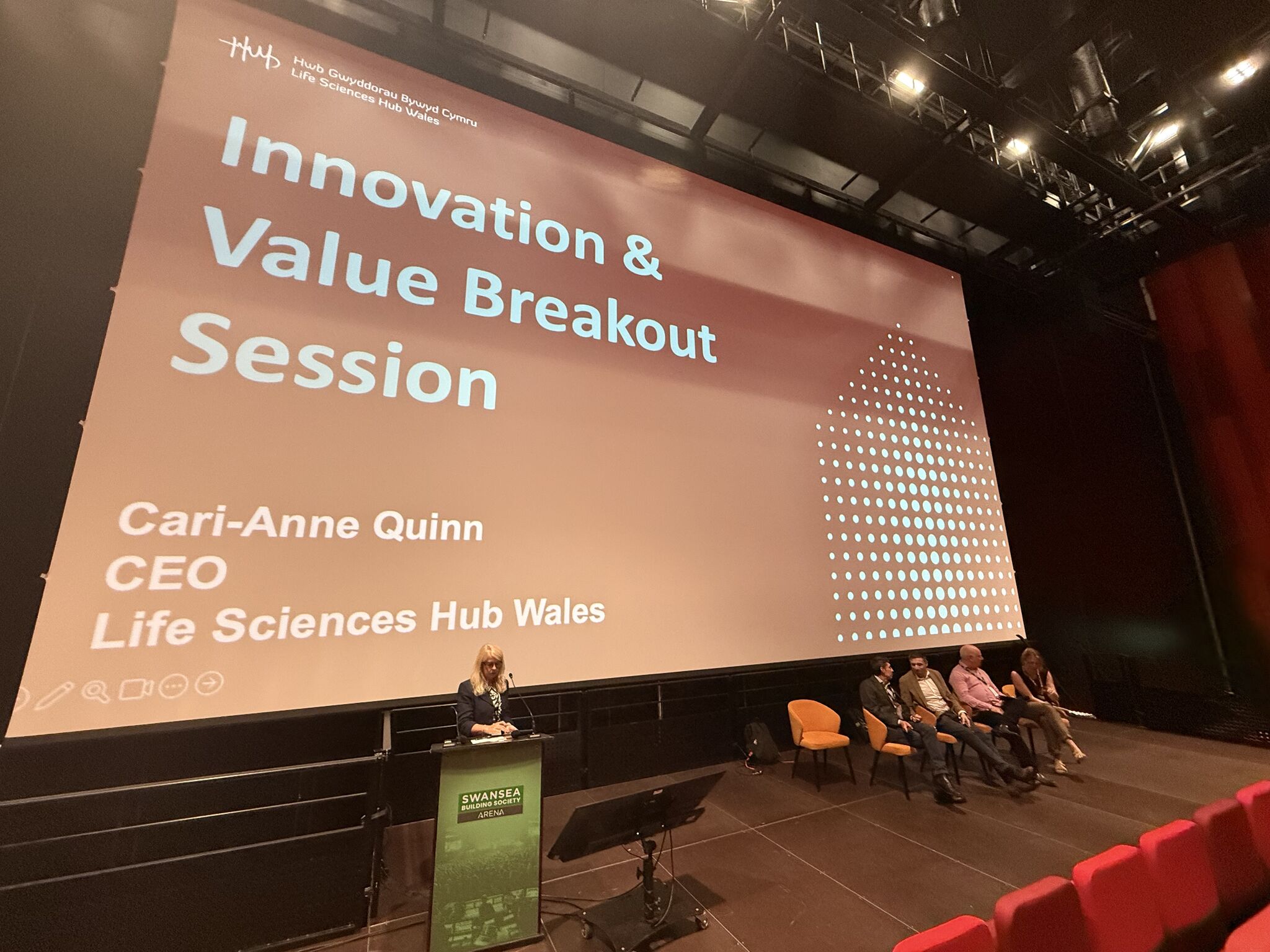Since launching its Net Zero Carbon Status route map in 2021, the Welsh public sector has been united in its efforts to reach net zero greenhouse gases by 2030. But how close are we to that goal? And what progress has been made so far? These pressing questions took centre stage at this year’s NHS Wales Sustainability Conference in Swansea.

The second annual NHS Wales Sustainability Conference was proudly sponsored by Life Sciences Hub Wales and featured talks from AstraZeneca, Digital Health and Care Wales, Microsoft and the Office of the Future Generations Commissioner for Wales to name a few. Here are my top takeaways from the event.
Health inequalities and climate crisis impact
The need to address the climate and nature emergency is urgent, with one speaker saying: “if we continue at this speed then it’ll be too late”. Our health depends on the health of the planet. The climate crisis shouldn’t be viewed on its own, it’s part of a much larger problem.
Dr Sumina Azam, National Director of Policy and International Health, World Health Organization Collaborating Centre said:
“There's a common theme, and that is inequalities. Inequalities in terms of the cause of the climate crisis, and inequalities in terms of the impact of the climate crisis. The poorest contribute the least to the climate crisis in the UK. Over a year, 15% of people contribute to 70% of flights. However, half the population don't fly at all. And if you look at the impacts of the climate crisis, it falls on the poorest.”
Wales faces some of the highest levels of poverty and poor health outcomes in the UK. The coming decades will see our population deal with hotter summers and colder winters, in houses and NHS facilities that aren’t built to cope with either extreme. With an already vulnerable population, failing to act now risks overwhelming our NHS with demand we can’t cope with.
Panel member Keith Reid, Deputy Chief Medical Officer – Public Health, Welsh Government explained:
“The way to tackle this is to look at how we can get a healthier population, so the overall demand for healthcare is reduced. The way to reduce the vulnerability of the most vulnerable is by tackling inequalities.”
System leadership and enabling change
A recurring theme throughout the sessions was clear: top-level engagement within health boards and trusts is needed to drive lasting, systemic change. The drive to become a healthier, greener and more prosperous Wales requires a bottom-up and top-down approach. This can’t be achieved in silos. Collaboration across all levels is not just beneficial, it’s vital.
This is easier said than done of course, but if it doesn’t happen then what does that mean for Wales? Since the launch of the Health and Social Care Climate Emergency National Programme in 2021 there has been a 12% reduction in building emissions and a 7% reduction in transport emissions, however the total emissions for NHS Wales have risen from one million tonnes of CO2e in 2019 to 1.16 million in 2024.
Collaboration is key
With the country’s ambitious plans, it’s critical for public and private sector organisations to work together to achieve goals set by Welsh Government. Whilst innovative projects and initiatives are currently making a difference, more need to happen and at a quicker pace to collectively achieve a net zero public sector by 2030.
One project that is currently happening in Hywel Dda and Aneurin Bevan University Health Boards stood out to me. They’ve joined forces with AstraZeneca on the SENTINEL Asthma project which aims to address the environmental impact of asthma and its treatment. Inhalers alone represent 3% of the total NHS emissions due to the current SABA (Short-Acting Beta2-Agonist) inhalers that are used. The SENTINEL project sees patients move from their old inhalers to new ones that are 99.9% lower in global warming potential. Project results from England have shown 44,275 fewer SABA inhalers in circulation which equates to 1,200 CO2e saved.
As part of the event our CEO, Cari-Anne Quinn, chaired a session on the importance of innovation in healthcare and its role in achieving sustainable healthcare delivery. Panel member Dr. Rachel Drayton shared some notable projects happening within Cardiff and Value University Health Board’s Department of Sexual Health. Among them, the team has replaced single-use plastic specula with reusable metal alternatives for vaginal examinations. This is expected to save two tonnes of carbon emissions annually. They’ve also begun cleaning and reusing specimen bags used for sending samples to the lab, further reducing waste. Not all projects need to be big to make a difference.
What’s next?
The 2025 NHS Wales Sustainability Conference made one thing clear, the path to a greener, healthier and prosperous Wales is a collective mission that demands leadership, innovation and collaboration. With cross-sector, cross-organisation and cross-expertise collaboration we can embrace the small and big ideas to build a more resilient, equitable, and sustainable future for Wales.
If we didn’t have a chance to chat at the conference but you’d like to learn about how we can work together and help drive innovation to the frontline of care, please get in touch on hello@lshubwales.com.

